Mussorgsky: Boris Godunov (Noseda)
Boris Godunov is one of Mussorgsky's few completed works. He was generally great at having wonderful initial ideas, and then fulfilling whatever he felt was necessary to get the bulk of those ideas realised, before either abandoning the project or just leaving it for so long it was left unfinished at the time of his death.
The fact that Boris was completed shows just how important the opera was to him, and the revisions he was compelled to make following the initial rejection of the score and libretto by the Imperial Theatres was even more evidence of the need to get the story told.
Many theories about why the rejection was so forthright have been put forward, mostly backed up by contemporary reports of there not being a major female role, however there was also the problem of an Imperial ruling from 1837 which forbade the portrayal of Tsars within opera unless they were from the Romanov dynasty. The fact that the Romanov family suffered harshly under the Godunovs probably didn't help matters, especially as Boris, despite being shown as a deeply troubled person, emerges as a hero for whom there is much sympathy.
The original Pushkin drama from which Mussorgsky created the opera was also highly butchered by the State censors, and it wasn't seen on stage until 30 or so years after the author's death, so Mussorgsky could be forgiven for thinking he was on a hiding to nothing in his own attempts.
It also didn't help that Mussorgsky had actually created his own form of Russian music-drama. There were no huge uplifting arias, and the orchestration was surprisingly bleak, with the instruments playing as if supplementing the text rather than taking the reins. As Gianandrea Noseda says in the all-too-brief but excellent extra, the sound world of Boris came out of nowhere and very little, if anything else at all was developed from it, so it stands on its own as the 'true' Russian opera which those who saw it first didn't know what to do with.
In this performance, Noseda and the director, Andrei Konchalovsky have gone for an amalgamation of Mussorgsky's first draft and the final scene of the second. It's not strictly 'what Mussorgsky would have wanted' of course, but keeps the overall dramatic flow of the original in two parts (8 scenes) and a very brief epilogue - at least I think the Epilogue is included. It's supposed to be a 'reprise' of the 'Holy Fool's' lament, but apart from a brief appearance he doesn't actually sing anything. I'll let this pass however.
Omitting the additions made for the second version (such as the 'Polish Scene') removes much of the lightness which Mussorgsky quite happily added, but this can sometimes interrupt the flow of the main story and so, possibly controversially, improves things no end. Any issues about the precise order of the drama should be silenced once the sheer quality of this production is experienced.
There are two main characters in the operatic version of the story. Boris himself, the highly paranoid, tough but essentially fair Tsar who is suspected of murdering a young boy to get himself on the Russian throne (there is little or no evidence of him actually doing so, but you only need the spark of an idea to spread and you begin to see enemies everywhere - and in Boris's case, he wasn't wrong).
Orlin Anastassov makes a very persuasive case for the character and the opera itself. He was only 34 when this was recorded but his voice and stage presence commands the respect of someone who has been singing the role for many more years than he has done himself. Almost teetering into the realms of melodramatic gestures (although I suspect this is a result of the close ups those in the audience didn't have), this is a performance that on its own will bring you back to this work several times.
The second main character is that of 'the people'. The whole story revolves around the shattered hopes of the Russian masses (mostly serfs - a situation which Godunov had created himself while Tsar 'in waiting', with the idea that people should be tied to the land growing food but unfortunately turned into one of the most infamous forms of oppression in history). As 'the people', the Chorus of the Teatro Regio (together with the excellent young singers of the Children's Choir and the Giuseppe Verdi Conservatoire) are on stage for huge swathes of the work, and produce some of the most dramatic and vibrant chorus work you're likely to see. Superbly choreographed sections (which are helped by the size of the chorus) create a real sense of threat and menace, especially during the Jesuit torture scene.
Despite the perceived lack of principal female roles by the Imperial Theatre censors, Mussorgsky did include two important characters in the shape of Boris's daughter Xenia. Alessandra Marianelli gives a very convincing and moving (literally), as she rocks continually in her song, showing a very fragile state of mind.
There is also the role of the Innkeeper, gamely performed by Nadezhda Serdjuk, who provides a perfect little masterclass in how to get as much out of a 'minor' role as possible.
Ian Storey (Grigory) produces a storming performance as the 'Pretender' (he has taken on the identity of the murdered child who was in line to become Tsar himself) and to me, his Russian sounds as convincing as those for whom it's a first language. Peter Bronder (Prince Shuisky) is another English tenor who revels in the part, and makes a highly convincing back-stabber.
Despite being two fairly despicable monks, Varlaam (Vladimir Matorin) and Missail (Luca Casalin) provide some comic relief, albeit short-lived, in the Inn scene, with Matorin proving a vocal force to be reckoned with in the later 'Forest Scene'.
Evgeny Akimov is superb as the 'Holy Fool', a blind cripple who is constantly tormented by the young children, yet is the only one who is allowed to speak his mind to the Tsar. He has a wonderful ringing tone to his voice, but even with this can manage more than a hint of menace when necessary.
Special mention must be paid to Pavel Zubov, the young treble, who sings the role of Boris's son, Fyodor, with great professionalism and musicality.
If I felt any slight disappointment with any singing on stage, it was with the opening lines sung by Vladimir Vaneev (Pimen). Maybe it was a difficulty hearing the orchestra, but it sounded as if there were some issues in hitting the right notes for quite a few seconds. He is tremendous later on however, which is what you would expect from a singer who has had great success singing the role of Boris himself.
In the pit, Noseda's expertise in this repertoire is obvious, as is the effort he puts into getting as much out of the orchestra as he does those on stage. The orchestra plays brilliantly, bringing out Mussorgsky's unusual (for the time) textures with ease and there's a nice slight stage-bias in the sound which makes everything sung 'up top' very clear.
The production itself is dark and savage, and all the better for it. Most striking is the decision to cover many faces with sores, boils and various other defects which are often quite disgusting in close up (of course, Grigory is almost caught when his own 'pimple' is mentioned in the arrest warrant), but as with many close ups you also 'see the joins' of a lot of hairpieces and stage make-up is staring you in the face - something you have to put up with in a filmed production.
Costumes are equally authentic, with enough (probably) fake fur on display to put any PETA supporter into therapy for a considerable time. This was a dirty, dangerous period in which to live and the minimalist (but highly effective) dynamic scenery and lighting reflects both the financial and moral poverty in which everyone lived.
I mentioned earlier on that there is also a worthwhile extra on the DVD in which both director and conductor pass on a few very honest soundbites about their ideas behind the production. Konchalovsky is particularly forthright in his opinions of DVD recordings and the role of the director. In his opinion, as long as people aren't bored but have an opinion about something they have seen, then whatever that opinion is, is correct, whether positive or otherwise. If a production forces some sort of 'intellectual masturbation' on an audience then it has failed. This is a very refreshing idea from an opera director, and one which many others should take on board.
This is a very satisfying and superior performance in every way, without any of the interferences you may find in some operatic presentations, but because of the episodic nature of the music the DVD (filmed over three nights in October, 2010) is episodic as well. Each scene is separated by a blackout and this, together
with some of the actual music, almost breaks up the continuity but not so badly as to ruin the performance.
There is just one fairly major annoyance, and that's right at the beginning of the DVD where the title credits roll against the music to Scene ii and we have a quick 'behind the scenes' montage of the cast getting ready for a dress rehearsal/performance. It would have been far better to have had something like this as an extra, as it seems completely out of place just a few seconds before the beginning of the opera.
Other than that, I have no complaints.
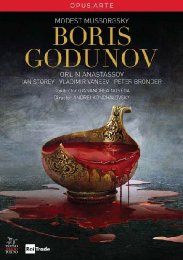
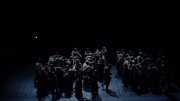
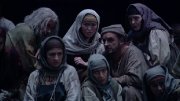
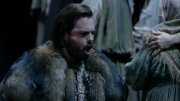
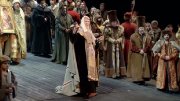
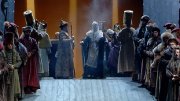
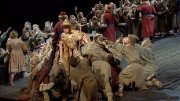
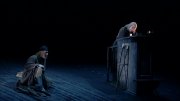
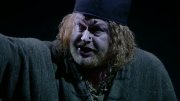
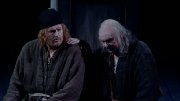
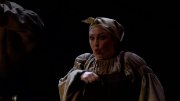
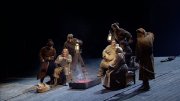
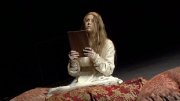
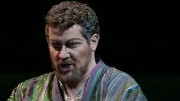
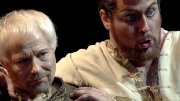
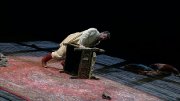
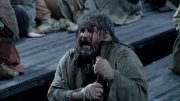
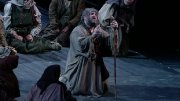
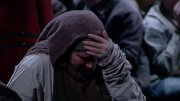
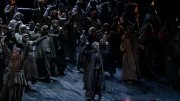
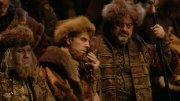
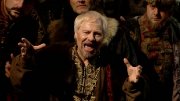
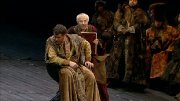
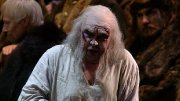
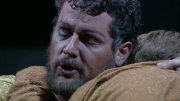
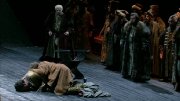
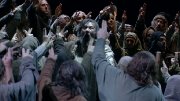










































Your Opinions and Comments
Be the first to post a comment!